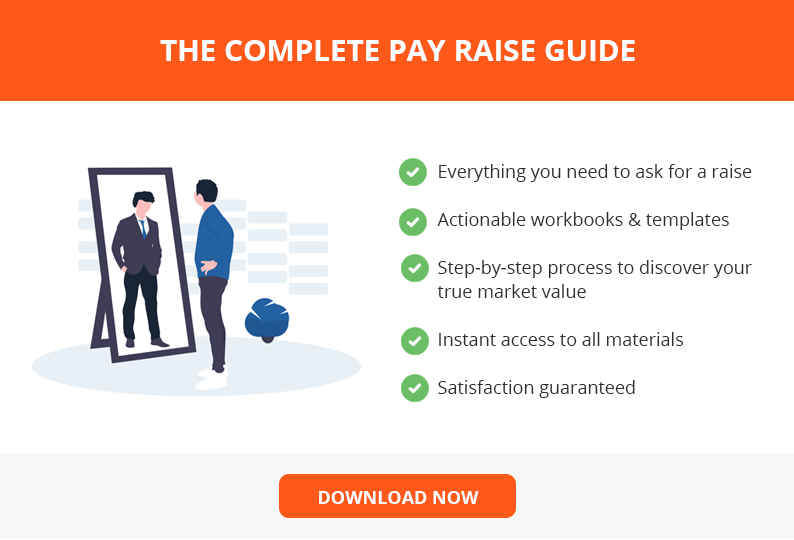Asking for a raise is not an easy task, and we know how hard the whole process can be. Working up the guts to ask for a raise can take a lot out of a person. If that request is denied, it can make you feel even worse after. While this may be the case, did you know that there are actually some pretty solid guidelines to follow when asking for a raise?
That’s why we’ve put together an ultimate guide to show the best way to ask for a raise. We’ll be breaking everything down into easy-to-read sections, this way you can skip around to any section that may be a bit more relevant to you.
Now, with that being said, here is a look at what we’ll be including in today’s guide:
- Making a list of your recent accomplishments
- How to get paid what you deserve: Determining your market value
- When the best time to ask for a raise is
- How often you should ask for a raise
- When and how to actually engage with your manager for a raise
- How to handle a denied request
- How to approach a raise in part-time work
- When and how to ask for a raise in government work
- How to ask for a raise with union work
- A brief recap
Almost 80% of employees are unhappy with their rate of pay, and this really comes down to the fear that comes with asking for a raise. Do you want to remain a part of that 80%? Or do you want to know the best way to ask for a raise? If your answer was the latter, it’s time to get focused.
So now that you know what we’re getting into, let’s take a look at the best way to ask for a raise.
Are you ready?
How to ask for a raise: First, make a list of your recent accomplishments
The first thing you should focus on, and this really applies to any position, is to put together a list of your recent accomplishments. We may all feel entitled to earn a little more, but when push comes to shove you need to show your employer why you deserve that raise.
Have you recently succeeded on a project that benefited the company?
If you’ve benefited the company in any way, it’s always a good time to ask for a raise. This is due to the fact that you can compare your success to company’s success, and in doing so prove that you’re worth more than your current pay level. This is definitely the best way to ask for a raise, because you’ll actually have something to show for it.
Show how you’ve increased profits
This is another great way to show you deserve a raise, and it’s not incredibly hard to do. If you notice that the company you work for is seeing a 10% increase in net profit after something you’ve worked on, don’t you think that you should share some of the spoils?
So after you wrap up a project, take a look and see just how influential that project was. If you notice that there is a noticeable amount of profit coming directly from your work, it’s time to ask for a raise.
Have a list of your accomplishments ready to go
This might sound silly, but you should actually consider writing all of your recent accomplishments down. It might be one thing to simply talk about your work, but if you can give your manager something to look at this is a totally different ball game. Think about it, a written list of your accomplishments can be shared with HR, and your chance of getting that raise will definitely increase.
You don’t need to go too crazy with it, but we definitely recommend typing this list up. It will look better than a handwritten note, and shows that you care.
Has your title changed?
If you’ve received a different title that’s not a promotion, that doesn’t mean that it’s not enough for a raise. This is due to the fact that a new title may actually come with more work, and may possibly come with a change in your work routine. If this is the case, and you find yourself in this situation, it may be the best way to ask for a raise.
A title change might not seem significant, but if there is any type of added responsibility that comes with that new flashy title, it’s time to ask for a raise.
Did you take on more responsibility?
Taking on more responsibility comes in many forms. Most of the time it will happen when someone leaves the company. If you notice that you’re forced to pick up some additional slack, or if expectations of you become higher, asking for a raise is certainty acceptable. This is due to the fact that you’ll be doing more work for the same pay, which can become quite tiring.
If you take on additional responsibility it’s definitely time to ask for a raise. Make sure you use this added responsibility as added fuel for your argument. Your employer will have a tough time disagreeing. Also, keep in mind that added responsibilities means more leverage.
Have you moved to a new location?
Working is not always a blessing, and sometimes we have to make some pretty tough choices. Unfortunately, one of these choices could mean moving to a new location.
While this may not seem like a major accomplishment, that doesn’t mean that it doesn’t deserve some additional compensation. So if you find yourself in a tough spot, it might be a good time to ask for a raise.
Moving to a new location also opens up avenues for some additional revenue in the form of perks as well. For example, if you do get stuck moving, try asking for some extra amenities such as:
- Your organization footing the bill for the move
- The company providing you with transportation or a company vehicle
- Your company paying a percentage of your living costs in the new area
Also, there is another angle here as well. If you’re forced to move to a high income area, we’ll use New York as an example, you might need some additional compensation to keep living your current lifestyle. So if you’re being moved to an expensive area, it might be the perfect time to push for a salary increase.
Talk about future accomplishments
This might seem counterproductive, but this is actually a pretty good strategy. This is due to the fact that speaking about how you can impact the company in the future will make an employer more inclined to work with you. Why? Because it shows that you’ll be there for a while, and it also shows that you care.
So during your next performance review, don’t just bring your past accomplishments with you, bring the goals you aim to crush in the future as well.
If you’ve done some really good work recently, it might be the best way to ask for a raise. Think about it, if a company is benefiting from your work, don’t you think that you should as well?
Use this as leverage, and make sure that you make a very good case if you do ask for a raise.
Action item: Make a list of 2-3 accomplishments in the past year.
How to get paid what you deserve: Determining your market value
The next thing we want to focus on is market value. This is due to the fact that the value of your work is actually determined by the market, which in some cases can actually work in your favor. Let’s take a look at some good strategies to figure this out.
Use online salary resources
Websites like Blind or Glassdoor are excellent resources to work with. They will show you exactly what the market is paying for your work. With these services, you can input a search for your current position and location. From there you’ll be able to see how much others are making for the same role.
Why is this powerful?
These are powerful tools for a few reasons, but the main one is they can actually give you a bit of leverage during a meeting. Instead of simply asking for a pay increase, you’ll be able to pick a number and really gun for it. Plus, when you present your company with an actual figure, it’s a better bargaining chip than simply taking what they offer you.
Glassdoor and Blind are only a few of many job review websites. Feel free to check out places like, LinkedIn, Indeed, and anything else you can find from a quick google search.
Inquire about what your coworkers currently make
This really depends on the type of person that you are, but seeing what your coworkers are earning is a good way to determine whether you deserve more or not. So if you’re someone who is not shy, we definitely recommend that you ask around.
How can this help?
If you notice that people who have the same role as you are making more than you, well, that’s definitely grounds for a promotion. If you’re more of the shy type, don’t worry, because we have more waiting for you in the next couple of sections.
Knowing how much your work is worth is crucial, and the best way to ask for a raise. This will place a bit of pressure on the company, and more often than not, showing your value will work in your favor when asking for a raise.
Once you know your accomplishments and your pay relative to others, you could also take the Raise Guide quiz: Should I ask for a raise?
Action Item: Find comparable pay ranges for your job and location. For more details, see our guide: How much of a raise should I ask for?
When is the best time to ask?
Now that you know what you need to know before asking for a raise, it’s time to get into the details. You want to know how to ask for a raise, right? If you thought yes; you should definitely pay close attention to this section.
What is the best time of the year to ask?
Every company has to put together a new budget once the fiscal year ends. While that budget will apply to other businesses operations, this budget will also include employee salaries.
Therefore, it can be a good idea to start asking for a raise in December. This is due to the fact that employers may be a bit more lenient with budget adjustments before the final budget is actually released.
You always have a better chance of securing a raise if your company’s budget has not been finalized yet. This may be annoying, but it’s a reality you have to face. Also, if you don’t benefit from performance reviews every 6 months, this really is the best way to ask for a raise (timing -wise at least)
Performance reviews
If your company has structured performance reviews it may be a good idea to comply with them. This is due to the fact that these reviews are put in place to monitor your progress, which means that they’re the best way to ask for a raise. Plus, during most reviews, the topic of a raise will come up on its own.
Performance reviews give you the chance to speak your case, and they’re usually designed to monitor your performance and determine whether or not you deserve a raise anyway. This means that you should always go into these meetings prepared.
After a major project
If you were tasked with working on a major project, it might be time to ask for a raise once it’s over. This applies to those of you who may have gone the extra mile on the project, and your chances are actually quite good if the project encourages company growth. So if you’ve done a great job on your last assignment, it might be time to ask for that raise you’re looking for.
Timing is really key when it comes to asking for a raise. This is due to the fact that each company has its own rules in place for granting raises. Now, with that being said, we always recommend consulting your company handbook for those specific guidelines.
Action Item: Make a list of the 3 best times you could ask for a raise. For more ideas, read our guide on the best time to ask for a pay raise.
How often should you ask for a pay raise?
Asking for a raise can come off poorly if asked for too often. That’s why we want to set some time aside to show exactly how often you should be pushing for a raise. While you may want to ask for a raise every single day, trust us on this one, patience is definitely key.
Rule number one
Asking for a raise can actually lead to some issues if you happen to push for one too early. This is why we always recommend that you work with a company for at least 6 months before pushing for a raise. Also, most companies will have their own structure in place for giving raises, so make sure you read up on that first.
Also, if you haven’t been with the company for at least 6 months you really haven’t had enough time to show how much value you bring to the table.
If 6 months seems a bit too short, you can always try waiting a year. We definitely recommend getting an understanding of the company culture before you go ahead and ask.
Rule number two
The second rule to follow is one of frequency. We know that you want to ask once a day, but to be blunt, this can harm your chances. Therefore, once you’ve been with a company for over a year, you should only ask for a raise every 6 months.
Rule number three
If you’ve asked for a raise, and your request was denied, you should never ask for another raise immediately. This can cause an employer to become frustrated with you, which can lead to issues down the line. In this case, wait until your next review instead. Use the time to ensure you make the best case for a raise.
If you follow these guidelines, asking for a raise should never put you in a bad position. Unfortunately, if you don’t, asking for a raise can actually come off as a bit too eager.
Action Item: Decide how often you should bring up the topic of a pay raise with your manager. Also see our guide on how often should you ask for a raise.
When and how should you ask for a raise
This section is going to be a bit more geared towards the specifics. What do we mean by that? It’s actually quite simple, we’ll be breaking down the way in which you should approach your manager when the time comes.
Let’s have ourselves a look.
Always ask in person
You should never try to ask for a raise over the phone or through a text message. Honestly, it’s because of emotion. Asking for a raise generally goes better when emotion is involved. Hiding behind a phone tends to make it easier for management to say no.
Never try to ask for a pay raise over the phone or through a text message. Your chances of getting it will be lower. Share on XGo with an in-person meeting. Approaching your manager in person to set a meeting will definitely go much better. And it doesn’t have to be a formal meeting either. Go on a walk. Or meet away from your desks or place of work.
If you can’t get in touch with your manager in person, or if you work remotely (from home), don’t defer to email yet. A video call may be best. Or a phone call if that’s not an option. Only after a video call or phone won’t work, a well-written email is your best bet.
Whatever you do, don't raise for a pay raise over a text message. Share on XWhatever you do, don’t raise for a raise over a text message. It may seem archaic, but trust us on this one, it’s a bit more formal. It is OK to ask for a raise over email if your company communicates mostly by email.
Mondays really aren’t good for anything
Some people may be ready to crush it for the work week. But the chances of your boss being that way are pretty low. Once the weekend has ended, there is a good chance that your boss is suffering from the same Monday blues that you are. Besides, who wants to deal with a sudden personnel issue on a Monday morning?
This means that you should probably avoid asking for a raise on Monday, because your boss’ mood can really play a role in your chances. So even if you’re anxious to get back to work, we definitely recommend waiting until the end of the week before you ask for a raise.
Wait until your manager gets back from a great vacation
Vacations are a truly wonderful thing. Trust us on this one, a week away from the office can really change a person’s mood. This is why asking for a raise once your boss gets back from vacation is a great idea. This is due to the fact that your boss will probably be in a great mood, which means that your chances will be much higher.
This definitely sounds silly, but think about how refreshed you feel after a vacation. The first couple of days you’re back, it’s almost like nothing can bother you.
Approach your manager with confidence during the meeting
One thing that we strongly encourage is confidence; when people say confidence is key, to be blunt, they’re not lying to you. Now, with that being said, always be sure to enter your next review with the confidence you need.
Present your accomplishments, and make it seem like you truly deserve that raise. Unfortunately, if you act a bit timid, your manager may not be inclined to give you that raise you’re after. So save yourself some trouble, and go in there with your head held high.
We know this can be hard, but trust us on this one, it’s very important.
Know your boss
Everyone has a different boss, so it’s hard for us to give you a straight answer for this one. Take some time to observe your boss’ moods, habits, and good days. Catching your boss in a bad mood can ruin your chances of even asking for a raise. So make sure you catch your boss at the right time.
We’ve gone over moods quite a bit already, so we’ll leave the rest up to you.
After lunch
You can ask for a raise in the morning, but your boss is probably a bit focused on urgent tasks. That might make you think that the end of the day is the best time to ask for a raise. But this doesn’t work either. Why? Because your boss probably just wants to run out the door. This is why Raise Guide suggests asking for a raise after a lunch break. Because your boss will most likely be in a better mood.
It may be annoying, but your chance of getting a raise comes down to the mood of your boss sometimes. You know your boss better than we do, so make sure that you pay attention to their mood. If you notice that they’re having a really good day, it might be the best time to ask for a raise.
Action Item: Plan out the best times to ask for a raise.
What do you do if your ask for a pay increase is denied?
This is a heartbreaking moment. You put that request in, provide them with your accomplishments, and even blow your manager away. Unfortunately, sometimes it’s just not possible to receive a raise based on circumstances. It can be a bad feeling when you ask for a raise and don’t get it. It may also have nothing to do with you.
So if you find yourself in this position, don’t panic, because there are other routes you can take.
Try and see if you can be compensated in a different way
This might sound counterproductive, but this really comes down to what you’re looking for. Think about it. Even if you can’t get that extra bump in hourly pay, maybe you can get a better benefits package. Asking for perks is a great way to get some extra compensation without seeing a direct pay increase.
Alternate compensation can come in a wide variety of options. Here is a list of some potential company perks that you may be able to ask for:
- A company car
- A benefits package
- An expense allowance
- A company card
- More paid vacation; paid vacation if you don’t already have it
- More vacation time
- A more flexible schedule
Keep in mind that these are only a handful of the company perks that exist out there. Think about your organization. Then, base your ask off the perks that your organization is known to provide.
When asking for a raise, you may not always get what you want. While this may seem like the end of the line, sometimes it can be a blessing in disguise.
Try to set a performance review
This really only applies to those of you who did not ask for a raise during a performance review. In many cases, the best opportunity to ask for a raise is usually during a review. If you happened to catch your manager off guard, it might be a good idea to try and set the tone for a possible performance review.
Try to ask for a promotion next time there is an opening
Sometimes asking for a raise just isn’t going to work. This is due to the fact that you might be at your current ceiling. So if you notice that management can’t get you a raise at your current level, it might be time to consider a promotion.
Promotions will usually come with quite a bit of benefits, and these benefits usually go way beyond the money. Therefore, if there is an opening, it might be a good idea to push for it.
We always recommend checking to ensure there is a position available first.
Keep your options open
This should always be your last resort, and this is especially true if you love your job. Now, with that being said, keeping your options open can be quite useful for more than one reason.
The first reason is that you can use a possible opening as leverage. If another company makes you an offer, it could give the current company you work for an incentive to match that offer. Be careful if you’ll be using it this way. After all, your current employer could simply tell you today is your last day. But it’s definitely something worth mentioning.
The second reason is one that will result in you leaving. Seriously, give it a shot, and interview at a few places. If they do happen to make an offer, and it’s better than what you have, it might be time to leave your job.
So even if you do get denied -when asking for a raise- that doesn’t mean that it’s over. You still have options; you just need to know how to use them properly. If you’ve ever been denied, or if this is something you’re currently grappling with, hopefully this section has helped.
Action Item: Make a list of 2 other perks you could ask for.
Asking for a raise (Part time employees)
Being a part-time employee is definitely a bit different than working full-time. The amount of hours you work is lower, and at times it may feel like you’re just not as important as some full-time workers. Now, while this may seem like the case, it’s not exactly true. This is especially true if you’re asking for a raise in a small business. So if you work part-time or in retail sales, please pay close attention to this section.
Ask around
The first thing you should do, in part-time work at least, is learn about how much your coworkers are making. If you happen to discover that they’re making more than you, this is definitely a good time to ask for a raise. Also, if this is the case, there is little to no chance that your request gets denied.
Consult the company handbook
We know that you’ve probably discarded this booklet by now, but if you can find it please do so. This is due to the fact that your company handbook will have all of the raise information that you’re looking for. You’ll be able to find out when you’re eligible, how you’re eligible, and how to ask for a raise.
Have you been aiding the company’s success?
This works the same way as it does with full-time work. If you’ve done something substantial for the company you definitely deserve a raise. Sure, you may be a part-time employee, but that doesn’t mean that your contributions should go unnoticed.
Just because you’re part-time, that doesn’t mean that your work is not important. If you can prove that, well, you’ll definitely land a raise in most cases.
Have your hours changed recently?
This depends on your job. If you’ve been forced to work something like the overnight shift, it might be time to consider a raise. This is due to the fact that these changes can impact your life. Anything that changes your lifestyle is definitely raise-worthy. So if you just got stuck with the overnight, asking for a raise might be your saving grace.
This really only applies to extreme schedule shifts. If this happens to you, you should definitely be asking for a raise.
Consider asking for a promotion
If all else fails, and there is a spot open, asking for a promotion can be a slick way to get yourself a raise. This works really well in a retail setting, but can work in others as well. Therefore, if you notice that there is a part-time management position open, give it a shot and see if you can get your hands on the job.
Consider seeking full-time hours
Working full-time really comes with a lot of benefits. You’ll generally get a pay bump, and you’ll probably have the option to grab yourself some benefits. So if you notice that you’re working around 30 hours anyway, it might be time to consider going full-time if you can. You’ll get that raise you’re looking for, and you might get some added bonuses as well.
It might seem useless to even try asking for a raise if you work part-time, but this is far from the reality. If you find yourself in any of these situations, it might be time to give it a shot.
Also, feel free to follow the guidelines we provided you with for full-time work as well. You’d be surprised how similar the process of asking for a raise can be.
Asking for a raise (government employees)
If you’re a government employee the rules are a bit different. This is due to the fact that government jobs have their own raise regulations. The pay structure can be a bit confusing and inflexible. So if you work in government, don’t worry, we’re not going to leave you out of this one. Raise Guide also has a full guide on how to ask for a raise in government.
Look into each “step”
Asking for a raise in government jobs really comes down to the grade and step that you’re in. So, with that being said, the best way to ask for a raise in government is to ask for a higher step within your grade. For the most part the process is fairly similar to what we’ve gone over already.
If you’re working in a GS-5 job, that means that you’re in grade 5. Now, there are several steps to each grade of government work. So, you’ll need to shoot for a higher step. Therefore, if you’re currently at step 5, asking for a raise entails asking for a step 6 rate of pay.
Each government job will have a list of salaries attached to each step. This means that you’ll be able to see what that rate of pay actually is. So when push comes to shove, the good news is that you know what that raise will entail before you even push for it.
Pretty cool, right?
Look for a different role within your agency
Working within the government has its good sides and bad sides. This is due to the fact that each grade will have a cap on how much you can make. With a cap, you’ll need to move to a new agency or grade to reach a new level of pay. Now, in this case, the best way to ask for a raise would be to make sure that a position is open.
If you do happen to find one, make sure that you enter the meeting prepared. Bring a list of your qualifications with you, and be ready to explain why you deserve to enter a new role. If all goes well, you should get that raise you’re looking for.
Make sure that you ask for a raise before the budget is set
Finally, the last thing we need to mention is the budget. Unlike a business, which can make some changes on the fly, the government is a bit more fixed with their budget. This means that it will be very hard to ask for a raise if the annual budget has been established. So if you’ll be asking for a raise in government, make sure that you push for one before the budget at your agency is finalized.
Asking for a raise in the government is a bit different than traditional work. This is due to the fact that everything is a bit more regulated, so just make sure that you know and understand the process. It may seem impossible, but if you ask the right questions at the right time, a raise is definitely achievable.
Asking for a raise: Union employees
Working within a union job definitely has its benefits, but with those benefits comes less freedom. This can lead to trouble asking for a raise. After all, it may seem as if you’re stuck on someone else’s schedule. Now, while this may be the case, we definitely have some great advice for any of you union workers out there.
Speak with a union representative
This should always be your first step when dealing with unions. They’ll be able to update you in union guidelines. This will help you figure out how to ask for a raise. If you work within a union job you’ll generally be asking the union to speak on your behalf.
The only issue here is that individual raises based on merit are not exactly an option for union workers. This means that everyone will be required to ask for a raise in order for that to happen. Unfortunately, this means that you’ll need to make sure that your union can fight for you to get the raise that you deserve.
Asking for a raise within union work is going to be very difficult, but it’s not impossible. Union workers also share regular raises due to union contracts, so it’s sort of a double edged sword in that case. On the other hand, if you really feel as if a raise is necessary, try to rally the employees you work with. That’s your best chance in this case.
Recap: How to Ask for a Raise
We know that we went a bit over-the-top here, but we want to make sure that you know the best way to ask for a raise. Look, asking for a raise is extremely difficult. We just want to make sure that you have all of the tools you need to succeed. Seriously, a raise can be a make-or-break, so entering the situation with preparation is definitely important.
Now, with that being said, if you ever find yourself lost, please feel free to refer back to this post as a guide. We’ve said it before and we’ll say it once more. We want to make sure you go out there and actually get that raise.
Nothing will guarantee a raise. But we definitely think these tactics will improve your chances. Think about the situation that you’re in, and see what advice you can use to better your chances.
Now that you know the facts, do you think you know the best way to ask for a raise?
















